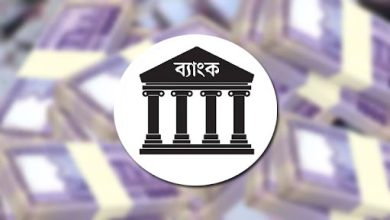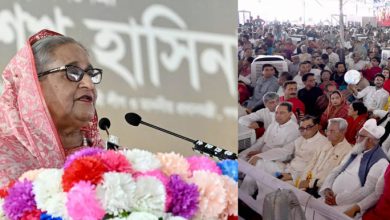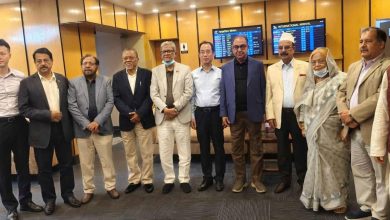Mega projects alone can’t ensure true development

Development of the country is not possible through the implementation of mega projects alone and without the human resource properly developed, said a noted economist.
“The infrastructure will end up looking like a skeleton and the country may fall into the low-middle income trap if the human resource is not developed,” said economist Wahiduddin Mahmud.
The government should look into whether its infrastructure projects could attract foreign direct investment (FDI), he said in a conversation with journalists about the economy.
The event was organised by Economic Reporters’ Forum (ERF) at its Paltan office in the capital yesterday.
Wahiduddin, also an adviser to a former caretaker government, said some measures could have been taken instead of implementing a few mega projects with foreign loans.
For example, if buses stopped at designated places of the city roads and the traffic was managed better, the government would not have had to construct the mega infrastructures to ease traffic congestion, he added.
The economist said if the rivers could have been protected from encroachment, the government would not have had to spend money on eviction drives and it would have also been able to develop an environment friendly communication system with low cost projects.
Wahiduddin said the government is implementing many mega projects with foreign loans which will have to be repaid.
Bangladesh’s foreign loan doubled to $100 billion from $50 billion in the last three years and it will have to repay $5 billion every year within the next three to four years. If the country borrows more, the repayment amount will increase, he said.
Also, some mega projects have been taken up at a time when giving financial assistance to low-income people is needed more. “This is not the time for taking up prestige projects,” Wahiduddin said.
The former Dhaka University professor said it is important to assess how much foreign and local investments would be available for mega infrastructure projects before taking up those.
He said Vietnam also built major infrastructures and was able to attract $10 billion FDI in a year, but Bangladesh could attract only $1 billion a year despite implementing mega infrastructure projects.
On education, he said numerous universities are being set up across the country without ensuring quality of education.
The economist observed that the country should set up a lot of polytechnic and nursing education institutes. He said a lot of nurses are recruited by Singapore hospitals from Kerala of India, the Philippines, and Indonesia.
Wahiduddin said a few mistakes in the economic management have caused the current troubles in the macroeconomic management and the ordinary people are suffering the most due to this.
High inflation, depleting forex reserves and current account deficit are the major crises the economy is faced with now, he said, adding that the severe fallouts of the Covid-19 pandemic and the Russia-Ukraine war only worsened the crises.
According to him, Bangladesh’s economy was performing well before the start of the crises and the government was suffering from complacency. For instance, the inflation was 6 percent and the US dollar exchange rate was fixed at almost the same rate for many years.
He said taka would not have depreciated so much against the US dollar if its gradual devaluation was allowed.
Wahiduddin said many influential borrowers are not repaying loans to local banks.
He said money laundering increased not only through under-invoicing or over-invoicing, but also through “hundi” and the money launderers built homes abroad with the laundered money.
They built homes at “Begumpara” in Canada and Malaysia. Many of them secured dual citizenship in Singapore, and owned hotel chains and real estate business in Singapore, the expert said.
The economist said the government could not check borrowers not repaying although banking transactions leave behind evidence.
The Hallmark Group took money from banks. There are paper and digital trails of the transactions, he said, adding, “What is the point of such digitalisation?”
All these bad incidents caused instability in Bangladesh’s macroeconomy, he said.
The authorities made another mistake by keeping the loan interest rate unchanged for many years. As a result, an uncertainty was created regarding the economy, he added.
He said the government should adopt an integrated economic policy in a transparent way.
Maintaining a balanced relationship with both China and India is important for Bangladesh as they are major sources for importing industrial raw materials, said the expert.
Also, maintaining warm ties with the Western countries is important as they are major export destinations for Bangladesh, he said.
The former DU teacher said it doesn’t matter whether Bangladesh became a BRICS member.
Payment for exports and imports without US dollars is not possible for Bangladesh as the balance of trade with the importing nations is not adequate to settle payments, he said.
In such a difficult time, the government should think about improving living standards of the low-income people. It should now take up projects which are least harmful to the economy, he observed.
ERF President Mohammad Refayet Ullah Mirdha and General Secretary Abul Kashem also spoke at the event.





These are really impressive ideas in concerning blogging.
You have touched some fastidious things here.
Any way keep up wrinting.